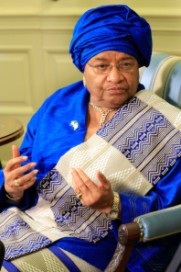The current economic challenge in Nigeria, occasioned by the drop in the price of crude oil, has positively pressured the country to intensify efforts to diversify and keep the economy stable. Remarkably, the Petroleum Technology Development Fund, an agency of the Nigerian government tasked with training and educating Nigerians for the Oil and Gas industry, is taking the lead in finding strategic means of sustaining its programmes. In this exclusive interview with African Leadership Magazine, the Acting Executive Secretary of the Fund, Aminu Ahmed Galadima discussed some of the strategies the Fund has adopted its programmes. Excerpts:
In an interview with Mr. President, he maintained that the task of making Nigeria great again, is beyond the office of the president, adding that his ministers, heads of agencies and other leaders do have a role to play. How is your agency aligning its mandate towards the actualization of the present administration’s Change Agenda?
Thank you very much for that question. In responding to it, it’s pertinent to identify which aspect of the Change agenda relates to the mandate and operations of the Fund.
I am aware that Mr President’s change agenda encapsulates areas such as corruption and governance, access to justice and respect for fundamental human rights, insurgency and insecurity, issues of Niger Delta, Health, Education, Agriculture, Management of the economy for shared prosperity, Power, Sports and Culture. The mandate of PTDF is to develop local capacity for the oil and gas industry which includes human capital development, institutional capacity building and research for developing local input and technology for the oil and gas industry.
Extrapolating from the priorities of the change agenda I can tell you that PTDF supports education and youth empowerment. Unarguably, no nation can sustainably develop beyond its human capital base. Value addition in human capital development, institutional capacity development and research for indigenous technology development are parameters that are cogent and compelling for the growth and development of any nation. A corollary is that for Nigeria to derive maximum benefit from its natural resource endowments, its citizens should and must participate effectively in the operations and management of its natural resources, particularly the oil and gas industry which contributes over 80% of the foreign exchange earnings and is the mainstay of our economy.
One of the things I did after taking over as Acting Executive Secretary was to set up a committee to review our current operations in capacity building and to re-direct the focus of our training programmes in order to adapt to the change agenda of Mr President. Specifically we needed to provide the right level of manpower support towards meeting this government’s economic growth prospect and proffer solutions to present and anticipated challenges in the oil and gas industry.
Technology transfer and domestication will no doubt contribute to creating more jobs for our teeming youths, especially in the face of rising unemployment in the country. How would you say the Fund has fared in promoting this initiative which is one of its major mandates?
We have implemented a number of training programmes and institutional development projects aimed at improving and increasing local content in the oil and gas industry. In this regard, we have trained a number of Nigerians to reduce our reliance on foreigners coming into the country to work for the industry. We also upgraded some welding and fabrication yards, and a number of key oil and gas related departments in our universities to enable them provide quality education and research in-country.
Technology and knowledge transfer is the main reason for these upgrades. Based on these interventions most of the people we have trained have gained employment in the industry locally and internationally. I should mention here that our welding graduates have been fully integrated into the industry as welding practitioners and instructors, some are working in DICON, others are working outside the country in Korea, in Brazil, UK and in most of the welding training centres in Nigeria that are supported by PTDF.
To promote the employability and versatility of PTDF scholars, the Fund has integrated internship, apprenticeship, practical attachments and entrepreneurial skills as compulsory components of its training programmes. The Fund is also working on effective utilization and proper management of our key training institutions which we established across the country for gradual domestication of capacity building.
One of your major mandates is human capacity development for the oil and Gas industry in Nigeria, through local and overseas scholarships. We are aware of some of the new policies of the present administration that have restricted access to foreign exchange. Has this affected the implementation of this mandate?
Of course, we operate within the Nigerian economy and expectedly any monetary policy of government will naturally affect us since our oversea trainings are denominated in foreign currency. Actually, some of the policies had impact on our operations but because we were proactive and having the support of government for our capacity building programmes, we were given some sort of soft landing or call it a special dispensation that enabled us to sustain the payment of our scholars tuition and upkeep allowances. However going forward, in the light of the current economic realities, the Fund entered into partnership agreements with some institutions abroad for joint sponsorship arrangement to fund scholar’s tuition and research, unlike the previous arrangement where PTDF bear all the cost.
The prevailing realities of the crash in crude oil price internationally have thrown both developed and developing economies globally into chaos-forcing them to seek strategies that would keep their economies stable; what are some of the strategies being adopted by the Fund to stay true to your mandate in the face of the current realities?
It is still the partnerships. We send students to some institutions overseas on a tuition-free basis. Instead of paying for full scholarships, we only pay for travel and maintenance, which bring down the cost of training. We have a partnership with the University of Sao Paulo in Brazil. Recently, we signed a Memorandum of Understanding with them. 20 MSc and PhD scholars of the Fund will commence studies at the university in September on tuition free basis. We have similar partnerships with some universities in France and Germany. These are some of the strategies we are exploiting to sustain ourselves and our programmes.
Some analysts have argued that with more funding for research, our universities may be brought to par with their counterparts in developing economies. To what extent is the agency supporting research under its institutional capabilities enhancement mandate?
Let me correct an impression here. Although we sponsor research in the universities for the purpose of enhancing the capacities and capabilities of our local institutions to deliver on quality teaching and research, it is not however the concept of our institutional development mandate. We actually sponsor research primarily to address and solve specific Nigerian oil and gas industry problems.
Through the endowment of professorial chairs in oil and gas related departments of Nigeria Universities and the award of Annual Oil and Gas Research Grants, PTDF is gradually domesticating the sourcing of inputs and relevant technologies needed by the oil and gas industry. PTDF has so far awarded 16 research grants to researchers in universities and endowed eight professorial chairs.
Six commercializable research findings have been recorded and filed for patenting. I am happy to announce that out of the six, two have received patents. These are researches on the control of fine migrations in reservoirs using Nano particles, and the research on the production of fuel Briquettes and Bio-Gas from water hyacinth-cow Dung mixtures for domestic and agro-industrial application in Nigeria.
A successful breakthrough in the local refining of heavy crude using locally produced zeolite catalyst derived from clay was recorded in PTDF Sponsored research at the Ahmadu Bello University Zaria. A prototype refinery using the locally-sourced materials has been developed.



